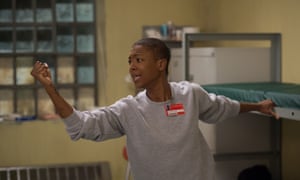Samira Wiley: ‘Margaret Atwood responded with a tongue emoji’ | Television & radio
Samira Wiley is modernity defined. While Elisabeth Moss, her co-star in The Handmaid’s Tale, rose to prominence in prestige television dramas such as Mad Men and The West Wing, Wiley has built a reputation almost entirely in shows made by streaming sites.
“It wasn’t a conscious decision,†says the 30-year-old over the phone, “the shows that are being written on streaming sites have surpassed anything seen on television traditionally.†After four seasons playing Poussey in Netflix’s Orange Is the New Black, she now plays Moira, an activist and lesbian â€" in a world in which homosexuality is punishable by torture and death â€" in The Handmaid’s Tale, made by US streaming site Hulu.
Both shows were game-changers. Orange Is the New Black broke new ground for myriad reasons, dealing with drug abuse, mental illness, and the experiences of bisexual, lesbian, queer and transgender women in an infinitely more complex and sophisticated way than had been seen in mainstream entertainment before. It also featured a large cast of relatively unknown actors, most of whom did not conform to the Hollywood stereotype.
“In the past, on television, the ‘ideal woman’ was thin, white and always looked perfect, the farthest thing from any woman on Orange,†says Wiley. “Now we know that audiences don’t want to see some ‘ideal woman’, they want to see women who look like themselves, or look like their friends, their aunts, their mothers, their children.†The Handmaid’s Tale, meanwhile, would likely have always found an audience, thanks to Margaret Atwood’s seminal novel on which it is based. But, given the political context in which it has aired, the dystopian programme has thrust itself into popular discourse in a way that few series have managed in recent memory. “For something to resonate in this way is just overwhelming,†Wiley agrees. “And to have it happen twice in row … that’s just unheard-of.â€
Wiley grew up in Washington DC, studied drama at the prestigious Juilliard School in New York, and spent the first few years post-college working in theatre in the city (she played Maria in Love’s Labour’s Lost for the city’s Public Theater company). Her career was never something carefully planned or strategised, she says, recalling an early meeting with her agent. “I remember going to his office and frantically telling him: ‘I just want you to know that I can do anything. I will do anything,’†she laughs. “Now, I think it is important to have some discernment.â€
Her close friend from Juilliard, Danielle Brooks, had already been cast as fellow inmate Taystee in OITNB when Wiley auditioned for the show’s debut season. “Orange gave me my life,†she says, emphatically. “Not just in terms of my career, but it’s also where I met my wife.†When she married Lauren Morelli, a writer on the show, earlier this year, her parents officiated (they are both pastors).
The show also dealt Wiley an unprecedented level of recognition overnight. When it launched in 2013, it was one of the first Netflix Originals. All 13 episodes were released at once, enabling audiences across the globe to binge the entire first season and connect with Poussey. “I didn’t know how to handle the success at first,†she admits. “I was scared. I had people following me home. I spent a few days not leaving the house because I couldn’t deal with it. It was a huge shock.â€

Wiley’s warm, funny, empathetic portrayal of her character soon became a fan favourite. “Poussey’s the definition of a lover not a fighter, and that is what people connect to,†says Wiley. “She’s a genuinely good person and she’s looking for love in prison, in such a pure way. When we look at her, we see potential, we see hope. We feel like, when she gets out, she is going to immerse herself back in society and have some success.†Consequently, the dramatic climax of the show’s fourth season â€" (spoiler alert!) Poussey’s death at the hands of a prison officer exerting undue force during a peaceful protest â€" was one of the most shocking and pivotal plotlines thus far.
“Everyone in the prison is affected by it,†says Wiley. Indeed, season five is all about the turbulent three-day aftermath of her death. Even though Poussey’s final storyline was inspired by the recent deaths of black men â€" including Eric Garner and Michael Brown â€" at the hands of US law-enforcement officers, Wiley says that at the denouement of the episode, race “suddenly goes awayâ€. “The other prisoners finally see Poussey as a person. Not as a member of the ghetto dorm or the black girl in that clique that they don’t talk to,†she says. “They think: ‘Oh my God, if this happened to her, then this could happen to me, too.’â€
For the actors playing the scene â€" Wiley motionless on the floor, Brooks sobbing beside the body of her best friend â€" it was no less highly charged. “Danielle and I were wiping each other’s tears,†she told the Hollywood Reporter.
Her metaphorical prison in The Handmaid’s Tale is no less bleak, brutal or dehumanising: the fictitious Republic of Gilead, formerly the United States, where environmental factors have reduced the global birthrate to almost zero. The country is under military rule and fertile women have been rounded up, forced to become handmaids for the ruling elite and their barren wives. Homosexuals meanwhile are branded “gender traitorsâ€. Her character, Moira, is, she says, “So many minorities, and she is all of the minorities that I am: she is a black, gay, woman. And the experience of walking through the world being a black, gay woman is such a specific experience. Sometimes, you can’t even talk about all of the things you go through, with that as your reality.â€
In the original text by Atwood, Moira’s colour is never divulged, but the Republic of Gilead is one of white supremacy: Jewish people were given the choice of converting or leaving for Israel, and ethnic minorities have been removed and “resettledâ€. Bruce Miller, who adapted the story for television, tweaked that detail. “If the TV show itself is an all-white world, then you are making a racist TV show,†he reasons. “It was more interesting to me to have a world where fertility trumps everything, including race.†Moira’s colour does not prevent her from being used a sexual slave by the Commanders of the Faith, albeit in a somewhat different way to Moss’s character, Offred.
Where Poussey was a lover, Moira is most definitely a fighter. “Moira has such strength, she is such a spitball of fire, and Offred (Elisabeth Moss) is boosted just by the idea of her,†says Wiley. “She has lines like: ‘Moira wouldn’t take this shit,’ and, ‘Moira wouldn’t be like this.’ When Offred says: ‘I intend to survive,’ I think she gets that Moira is always going to survive.â€

Wiley adds that she “really identified†with that. “Growing up,†she reflects, “I have been that person who pushes the envelope and is doing things that other people are not as ready to. I even think about my journey as being an out member of the LGBT community. I felt very connected to Moira in that way.â€
When the show went into production in the summer of 2016, no one could have predicted that by the time it was on telly, the US would be be under an administration where the rights of women, immigrants and the LGBT community would be suddenly and dramatically, under threat.
“We started filming before the election,†notes Wiley, “and after it had happened, we realised how much more prescient it all was. I suddenly thought: ‘We’re doing something very important here, we’re doing something that needs to be done.’ “At the end of the day,†she continues, “it is just television. But if we treat television in the right way, if we treat it as art, it can elicit real conversations and real change. I have seen it happen with Orange, and now I see it happening with The Handmaid’s Tale.â€
A second season of the show has already been commissioned, and since the first season ends faithful to the book, no one knows where the new material will go. But fans of the original text should take comfort that Atwood, a creative consultant on the show, will remain closely involved with its direction. Wiley admits that she was so nervous about meeting the esteemed 77-year-old author at their first team dinner that she switched places with Moss, to avoid having to speak to her. Now, however, the pair are firm friends. “If you go to my Instagram,†she says, “Margaret Atwood likes all of my pictures. She usually comments on them. It’s not like she writes in Atwood prose; they’re usually just emojis.â€
She still sounds somewhat disbelieving: “I put up a picture of me kissing my wife, and she just responded with a tongue emoji.â€
The Handmaid’s Tale continues on 9 July, 9pm, Channel 4

0 Response to "Samira Wiley: ‘Margaret Atwood responded with a tongue emoji’ | Television & radio"
Posting Komentar